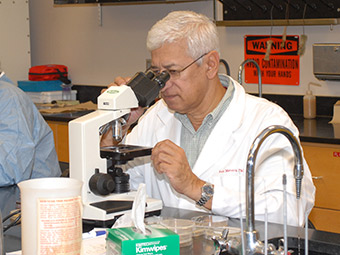Questing by Tick Larvae (Acari: Ixodidae): A Review of the Influences That Affect Off-Host Survival
Document Type
Article
Publication Date
11-2020
Abstract
Questing is a host-seeking behavior in which ticks ascend plants, extend their front legs, and wait poised for a chance to attach to a passing host. Hard ticks are ectoparasites of terrestrial vertebrates and because some species vector disease, they are among the most medically important of arthropod pests. All ixodid ticks require blood to survive and reproduce with the number of blood-hosts needed to complete their life cycle varying among species. The vast majority are three-host ticks requiring a different host for each developmental stage: larva, nymph, and adult. A few, including some of the most economically important species, are one-host ticks, that quest only in the larval stage. Questing is a rate-limiting behavior critical to tick survival and disease transmission. For the off-host larval stage, survival is highly dependent on ecological and physiological factors. Yet, off-host larval ecophysiology is often overlooked for the more obvious adult and nymphal tick-host interactions. This review summarizes the literature on ixodid larval questing with emphasis on how specific biotic and abiotic factors affect off-host survival.
Recommended Citation
Leal, Brenda, Emily Zamora, Austin Fuentes, Donald B. Thomas, and Robert K. Dearth. "Questing by tick larvae (Acari: Ixodidae): a review of the influences that affect off-host survival." Annals of the Entomological Society of America 113, no. 6 (2020): 425-438. https://doi.org/10.1093/aesa/saaa013
Publication Title
Annals of the Entomological Society of America
DOI
10.1093/aesa/saaa013



Comments
© The Author(s) 2020. Published by Oxford University Press on behalf of Entomological Society of America. All rights reserved. For permissions, please e-mail: journals.permissions@oup.com.